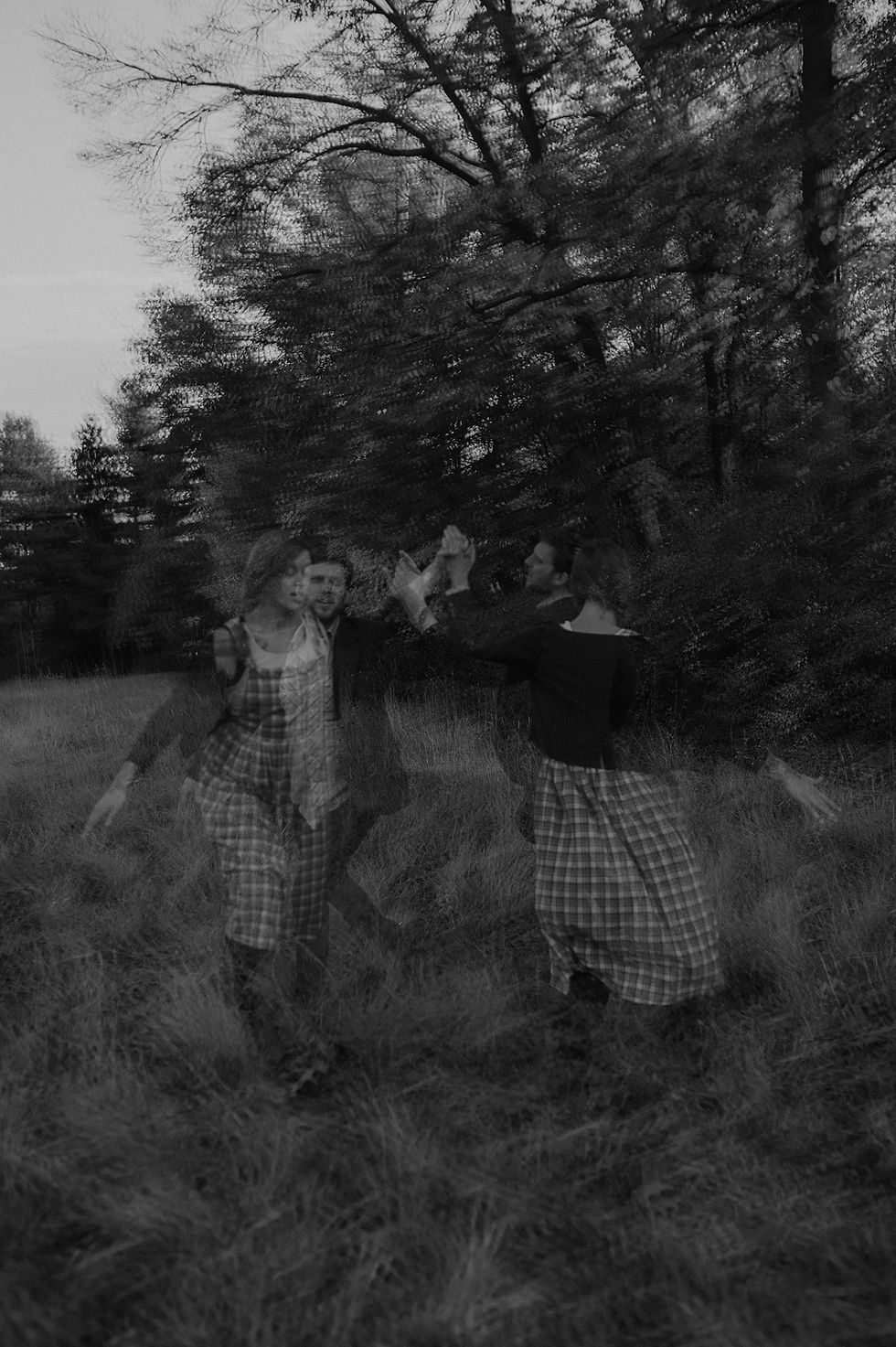Hallelujah of the Ordinary
- The Rough & Tumble

- Feb 13
- 6 min read
“If you don’t need their rewards, you do not have to play by their rules.” Nathan Johnson in Broke*, a documentary by Will Gray about artists and the music industry.

It’s been anything but ordinary these past few weeks. If you’re like us, you’re feeling beat down, discouraged, angry, and overwhelmed, like walking into a house after moving in, the question is “where do I even begin?” There have been attacks on DEI programs, trans rights, the firing of 2 million federal employees, and the instability of the very fabric that we as Americans have come to depend on. One of the more disconcerting aspects of this whole disconcerting mess, is that the world’s richest man has been hanging out in the oval office wearing a black MAGA hat, apparently volunteering his time to gut federal watchdog agencies. It seems like a lot of tireless, thankless work, if you ask me. Which makes me wonder, how much money does Elon Musk stand to make from the changes he’s enacting? Because a man like Elon Musk doesn’t just gift his time and services to the American people. This is an investment. And he will expect a return on that investment.
Nothing is free. Everything, from your tomatoes to your time has a price tag on it in America.
We just read a book by Robin Wall Kimmerer called “The Serviceberry,” a beautiful, short read that turned our world on its head. In it, Kimmerer, a botanist and member of the Potawatomi Nation, considers the way that these berries are gifts to us from our plant relatives, “manifestations of their generosity, care, and creativity.” She makes the point while picking serviceberries, “When we speak of these not as things or products or commodities, but as gifts, the whole relationship changes. I can’t help but gaze at them, cupped like jewels in my hand, and breathe out my gratitude.” We’ve all experienced that before, being overwhelmed by the goodness of the Earth and feeling that it is such a gift to be here. She calls this the gift economy- where exchanges of goods and services are seen as gifts between people (plants and animals are people too!) and not as trade or commerce.
We realized that our song, “Hallelujah of the Ordinary” was inspired by the gift economy. We’ve told this story before, but while we were out on tour 4 different neighbors came to our house at different times and planted us a garden so that when we got home in July, there were tomatoes, raspberries, zinnias, day lilies, cucumbers in full bloom. It was one of the most generous gifts we’ve ever received and we viewed that garden all summer as a gift. We’d pick a sun gold off the vine and the taste was that of having all that we needed, of being provided for by our community. And what was amazing was that it allowed us to be freer with our own resources. When we viewed our garden as a gift, we were more likely to share its bounty with others. (Our friends, Rowe and Laurie, modeled this for us with their exceptional garden abundance which we’re betting they’re going to plant again this year.)
Kimmerer says this is normal in a gift economy. You feel gratitude for the gift and that makes you want to give a gift in return. “Gratitude and reciprocity are the currency of a gift economy, and they have the remarkable property of multiplying with every exchange, their energy concentrating as they pass from hand to hand, a truly renewable resource. I accept the gift from the bush and then spread that gift with a dish of berries to my neighbor, who makes a pie to share with his friend, who feels so wealthy in food and friendship that he volunteers at the food pantry. You know how it goes.” This is the way community is built, one gift at a time. Like birthdays and Christmas, gifts are one way we show others that they belong, that they are family. They are one of the ways we tie ourselves together.
It’s a beautiful idea, and one that our American capitalist minds immediately shot holes in. “Who’s going to gift me a new guitar?” Or maybe more telling, “Does this mean that we need to give away all of our merchandise at shows?” It’s helpful to remember that it doesn’t need to be all or nothing. We have these huge social forces up against us, making us trade our time for pay so that we can pay someone to stay alive. It’s going to take a lot of time and work to remake that system and just because we don’t believe it’s good doesn’t mean that we can excuse ourselves from participating in it. But, as Nathan Johnson said, “If you don’t need their rewards, you don’t have to play by their rules.” He said this in reference to the bourgeoning independent music scene, but it applies to all alternative economies. It’s a powerful idea and one that can help us see a way forward in the next four years. If you stop playing by their rules, they lose their power over you.

This is the way we resist. This is the way we care for our community. If the cost of eggs is too high, the answer is to stop buying your eggs from the person overcharging you and instead go talk to your neighbor who owns a chicken. Maybe you have an egg laying chicken- how many eggs can you gift to your neighbor so that they won’t have to buy overpriced eggs?
If you are feeling overwhelmed by the news and all that is being taken away from you and your neighbor, go plant your neighbor’s garden. We can call them “Freedom Gardens,” like they did in WWII, but this time it will mean freedom from participating in their scarcity thinking, freedom from participating in an economic system that is actively taking away our ability to have a place in it. Since it’s still winter here in NH, maybe bake cookies for your neighbor instead. We’ve created a list of 10 things you can do to maintain your humanity and resist and in the spirit of fostering a sharing community we’d love it if you added your own ideas to the list in the comments.
This is not an ordinary time, but there are ordinary things we can do to remember that we are part of a community who cares for one another, simply because living is a gift.
Things to do to maintain your humanity and resist:
Plant a freedom garden
Download the 5 Calls app and call your representatives
Bake cookies for your neighbor (make sure you check dietary restrictions first)
Stop doomscrolling on social media, for self preservation but also to decrease the revenue of the bad actors who own these companies
Find a local concert series where you can go once a month (or more!) to be with people
Open up a little free library. And support your big free library!
Have a conversation with your barista when you’re buying your coffee
Join a local “buy nothing” group online
Donate some money to a cause you believe in, like the ACLU, Wikipedia, Florida Access Network, National Immigrant Justice Center, or the Trevor Project.
Give your used car to someone who needs it instead of trading it in at the dealership, so they can turn a profit.
What else can we do?
Hallelujah, these ordinary things can produce what may just be miracles.
"Hallelujah of the Ordinary"
Written by Mallory Graham & Scott Tyler
Start the kettle, push the press–
Hurry up get back to bed,
Your side’s getting cold
While mine stays warm.
Poured into my favorite mug–
Goddamn, don’t you love this stuff?
The little hallelujahs of the Ordinary.
Oh my how I love this love,
A laundry pile and dish soap suds–
While Maggie’s barking at I-don’t-know-what.
Puddle’s nudging for your spot–
You better up and cuddle us.
There’s room for Hallelujah of the Ordinary.
Hallelujah, hallelujah.
Everyone’s fast to say that everything dies,
But we know what they know–
That given some quiet and left alone,
Everything grows.
We left town for four months straight
Toured out through the 48
Didn’t get back home til mid-July.
All our friends, they knew our hearts
They planted a garden start–
There were zinnias and daylilies,
Tomatoes and raspberries
And they grew so Ordinary–
Hallelujah
Pull the cover, come to bed
We got a big day ahead
Singing Hallelujah of the Ordinary.









Comments